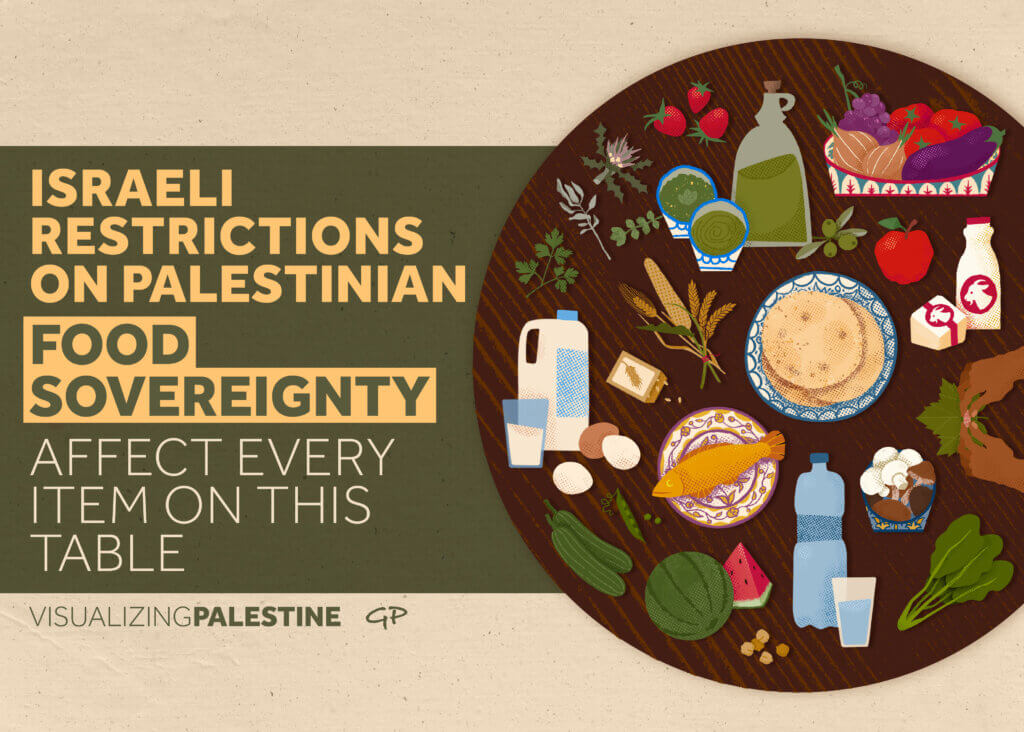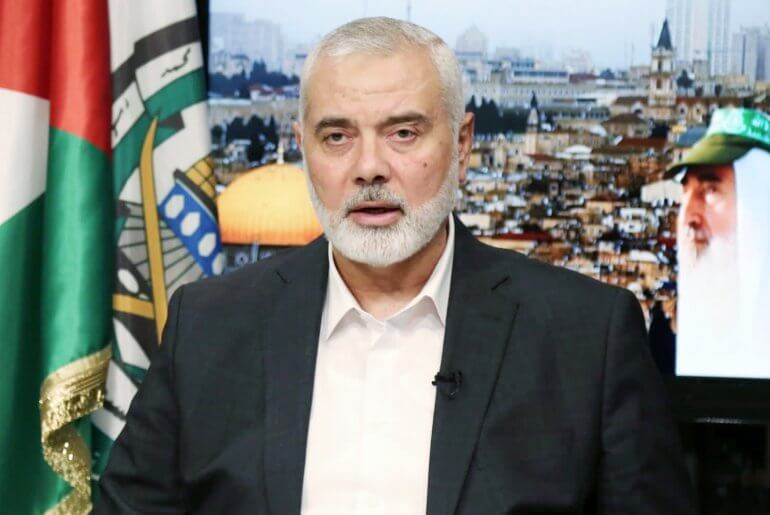The Palestinian table is famous for its abundance, but it is also subject to an abundance of restrictions under Israel’s system of settler-colonialism and apartheid.
Visualizing Palestine’s latest visual highlights how these restrictions add up to the denial of Palestinian food sovereignty, defined by La Via Campesina as “the right of peoples to healthy and culturally appropriate food produced through ecologically sound and sustainable methods, and their right to define their own food and agriculture systems.” Food sovereignty is an important principle embraced by the environmental justice movement that connects Indigenous peoples, peasant communities, landless people, and small to medium size food producers around the world. These groups play an essential role in food security, but are often denied control over the land they rely on for physical, ecological, and cultural survival.
Food Sovereignty Advocates for Land Rights
One of the seven principles of food sovereignty defined by La Via Campesina is agrarian reform, or reform that “gives landless and farming people — especially women — ownership and control of the land they work and returns territories to Indigenous peoples.” Agrarian reform also requires ensuring that the right to land is free of discrimination. The primacy of this principle is highly visible in the context of Palestine, where Israeli settler-colonialism has stripped Palestinians of the right to much of their agricultural land, creating high rates of food insecurity.
Palestinians have a long and rich agricultural heritage in the Fertile Crescent. As farmers, they have tended its fields and orchards for generations; as fishers, they have harvested its sea; and as herders, they have roamed its rocky hills and arid areas. At the time of British colonial rule, Palestinians were already farming an estimated 85% of cultivable land in Palestine, using rainfed, low-input baal techniques in harmony with the local climate and economy.
Israel’s denial of Palestinian food sovereignty is rooted in its discriminatory land policy across all areas it controls. During the Nakba in 1948, Palestinian refugees lost almost 4.6 million dunums of farmland, which the Israeli state quickly appropriated for the establishment of Jewish-only agricultural settlements. Overtaken Palestinian fields and orchards were celebrated as a marker of Zionism’s achievement and its ideology of ethnic supemacy. In the Naqab region, Israel rapidly expropriated 85% of Palestinian Bedouin land as state land.
Israel’s appropriation of agricultural land and assault on rural communities continues in today’s Ongoing Nakba. In occupied and besieged Gaza, 35% of agricultural land is inaccessible due to Israeli military measures. Al Mezan Center for Human Rights reported that the Israeli navy attacked fishers in Palestinian territorial waters 2,265 times from 2007 to 2021. In the occupied West Bank, 63% of agricultural land is under complete Israeli control in Area C, with Palestinian rural communities in Area C being some of the most vulnerable to Israeli policies of forced displacement. In the Jordan Valley, the Israeli military uses Palestinian farmland and pastures for drills, leaving behind unexploded ammunition that has later killed and injured Palestinians. The wall cuts off 10% of the West Bank, forcing thousands of Palestinian farmers to apply for permits from Israeli authorities to tend their own land beyond the wall. In 2020, Israel denied 73% of farmer permit requests.
The ongoing case of Masafer Yatta is one example of how Israel relentlessly targets Palestinian rural communities in Area C for forced displacement and urbanization. Masafer Yatta comprises 20 Palestinian Bedouin farming and herding communities living under Israeli military occupation in the South Hebron Hills. After declaring the area a firing zone in the 1980s, Israeli authorities have been hounding these communities with military exercises, home demolitions, and drawn out court proceedings. The Israeli Supreme Court, which reliably sides with the illegal Israeli settlement enterprise, recently rejected an appeal to prevent the expulsion of over 1,000 Masafer Yatta residents, paving the way for the latest installment of a decades-long campaign of ethnic cleansing.
Under Ottoman land laws, one way of acquiring ownership of land in Palestine was to cultivate it for a continuous period of ten years without objection from the state. Collective land rights were also recognized for grazing and other communal uses. Israel has reinterpreted and manipulated these laws to justify stripping Palestinians of land rights if they cultivate only part of an area of their land or if they stop cultivating an area of land due to Israeli restrictions, environmental factors, or other reasons. Additionally, Israel disregards Palestinian collective land rights.
While Israel’s colonial land policy is at the root of Palestinian food insecurity, Israel’s drive to control maximum land with minimum Palestinians has produced a plethora of measures to regulate and restrict non-Jewish food producers. These include denial of the right to water, denial of freedom of movement, attacks by Israeli settlers (committed with impunity), control over imports and exports, bans affecting herders and foragers, and the criminalization of the Union for Agricultural Work Committees. The items on the table in Visualizing Palestine’s food sovereignty visual depict a selection of these restrictions.
Greenwashing Food Insecurity
As a result of the denial of their food sovereignty, 69% of Palestinian households in Gaza and 33% across the occupied Palestinian territory were food insecure as of 2021. Reliance on food aid is particularly high in Gaza, where formerly thriving agricultural and fishing sectors have been devastated by Israel’s blockade, which will mark its fifteenth year this June. The framework of food sovereignty challenges the way the food insecurity paradigm often fails to address the structural and systemic causes of hunger and poverty, in this case the structures of Israeli settler colonialism and apartheid.
To add insult to injury, Israel has leveraged its control over water and other resources to build a thriving and globally prominent agriculture technology sector. Techniques such as drip irrigation, desalination, and wastewater reuse are celebrated as solutions to food and water insecurity in a changing climate, but the same policies that encourage Israelis to innovate contribute to greenwashing the food insecurity and de-development Palestinians experience under Israeli rule. Palestinian farmers, environmentalists, and human rights advocates have documented the ways that Israel’s water management harms Palestinian ecosystems, agroeconomies, and human rights, leaving their fields and faucets dry while subsidizing water for intensive production by Israeli settlements.
The agriculture technology sector exemplifies a broader technological solutionism pervading conversations about climate change in spaces of power. These are often corporate-dictated, government-approved approaches that focus on optimizing inputs, maximizing outputs, and pushing small scale farmers to abandon traditional methods in favor of consolidating systems that prioritize food as a commodity over food as a source of nutrition. The food sovereignty movement rejects the dominance of multinational corporations and multilateral organizations in shaping agricultural policy, instead advocating for democratic control over food systems and recognition of the importance of Indigenous and peasant knowledge in forging a sustainable future free of hunger, poverty, worker exploitation, and environmental degradation.
This visual builds on Visualizing Palestine’s previous visual work on environmental justice in Palestine, which explores concepts including climate vulnerability, green colonialism, environmental racism, and extractive colonialism.
Special thanks to Growing Palestine for their feedback and partnership in this visual, and to the many Palestinian farmers, environmentalists, researchers, and agricultural collectives whose work is leading the way in raising these issues.
Jessica Anderson
Jessica Anderson is Deputy Director of Visualizing Impact (VI), a non-profit organization that creates data-led, visual tools for social justice. Visualizing Palestine, the first and largest project of VI, provides tools that convey a factual, rights-based narrative of the Palestinian movement for freedom, justice, and equality.





“Israel’s appropriation of agricultural land and assault on rural communities continues in today’s Ongoing Nakba.”
It’s not just the land Israel is appropriating, it’s also Palestinian agricultural equipment:
https://www.972mag.com/tractors-agriculture-confiscation-israel-army/
The Israeli army is making millions by seizing Palestinian tractors…Data shows the military, with settler backing, is intensifying its confiscation of Palestinian agricultural equipment while profiting from release fees.